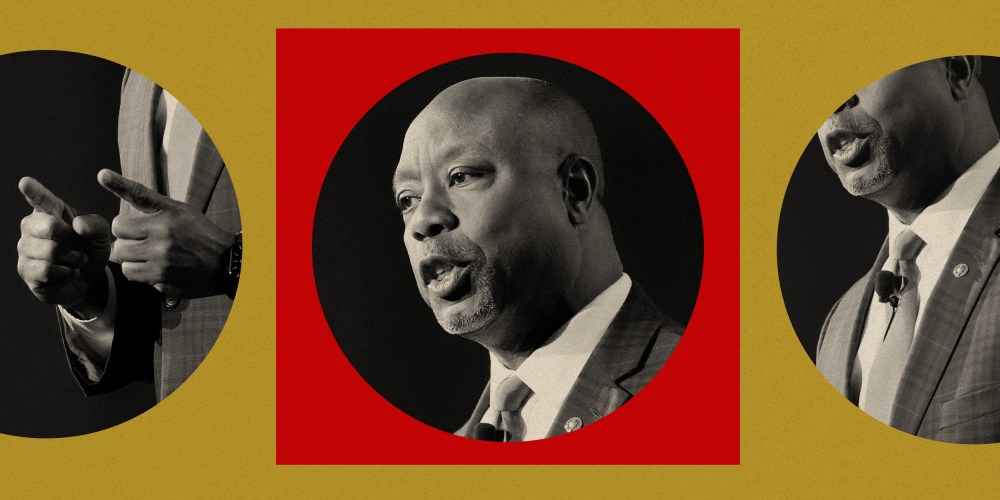The first GOP primary debate features 8 candidates — and one Trump-sized elephant in the room. Are any of the hopefuls fit to be president? Read this installment of MSNBC’s 2024 profile series and find out.
The Republican Party has, since the 2024 race began, appeared on track to nominate a four-time indicted, twice-impeached former president who undermined our peaceful transfer of power less than three years ago.
So, with Ron DeSantis’ campaign a distant, chaotic second, is there any other credible alternative to Donald Trump?
Step forward, Sen. Tim Scott of South Carolina.
Scott has been framed by pundits and the press as a down-to-earth, plain-speaking Black moderate who could save a far-right Republican Party from itself.
The New York Times has described him as an “amiable scripture-quoting” man. The National Journal dubbed him “a natural.” Politico called him “magnetic.” And everyone talks about his socks. How can you dislike someone with a strong sock game?
Scott has been framed by pundits and the press as a down-to-earth, plain-speaking Black moderate who could save a far-right Republican Party from itself.
But what if I told you that on issues like religion, race and Trump himself, Tim Scott is no moderate? That Scott’s conservatism actually places him in the company of the most extreme right-wingers in his party, on both social and economic issues? This is a conservative politician who has spent years pushing for tax cuts on the rich and celebrating anti-union laws in his state. His voting record on LGBTQ issues has earned him a consistent zero rating from the Human Rights Campaign — that’s the same score as people such as Reps. Marjorie Taylor Greene and Lauren Boebert.
Or take religion, an increasingly serious issue in American politics with the rise of Christian nationalist types like the aforementioned Greene of Georgia and Pennsylvania state Sen. Doug Mastriano. In the 1990s, one of the GOP’s favorite causes was pushing to have the Ten Commandments on public display. Scott, then a Republican councilman in Charleston County, introduced a bill to hang the Ten Commandments on a plaque outside the chamber.

“I want it to be in gold,” the councilman said. He later clarified to a local paper that “being a cost-conscious Republican, some other material might be more suitable.” He later got to be the one who hammered the Ten Commandments to the wall of his building — yes, he literally hammered them on the wall.
And what about that whole pesky separation of church and state thing? As a local paper reported at the time, Scott (falsely) claimed that “the Constitution was constructed to protect the church from government, not the government from the church.”
Of course, that was nearly 30 years ago. Perhaps he’s tempered that extreme — and extremely inaccurate — view? No. We asked him. Today, as a U.S. senator and presidential candidate, Tim Scott still believes that.
As for race, to be fair, Scott still has a better record than most of his fellow Republicans, though that is nothing to brag about.
As for race, to be fair, Scott still has a better record than most of his fellow Republicans, though that is nothing to brag about.
Back in 2015, South Carolina was thrust into the center of the story about racial tensions in America after police killed a Black man named Walter Scott — no relation to Tim Scott — and following the Charleston church shooting in which white supremacist Dylann Roof killed nine Black people.
To his credit, the senator from South Carolina seemed to meet that moment.
He introduced a police accountability bill, to reduce police funding for states that failed “to report certain data on deadly shootings by law enforcement officers.”
He delivered an emotional speech on the Senate floor about the church shooting, and he spoke openly about his experiences with police, even with police on Capitol Hill, who did not recognize him even though he was an elected official.
“In the course of one year, I’ve been stopped seven times by law enforcement officers,” Scott said. “While I thank God I have not endured bodily harm, I have however felt the pressure applied by the scales of justice when they are slanted.”
That was remarkably refreshing to hear from a Republican lawmaker.













